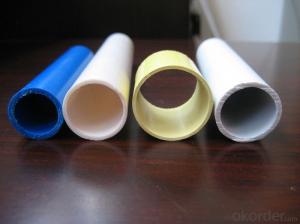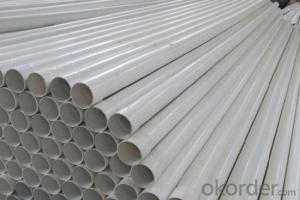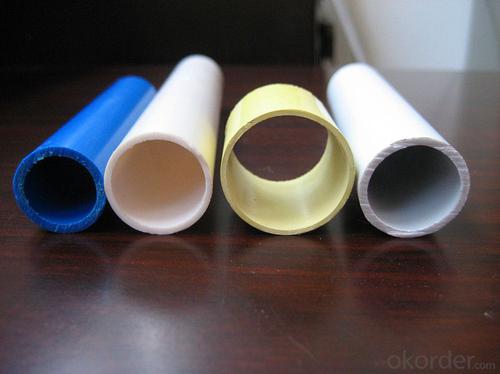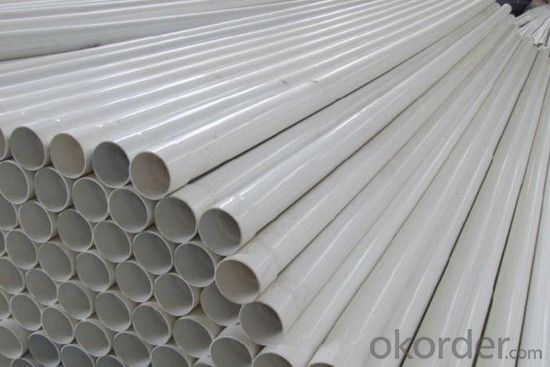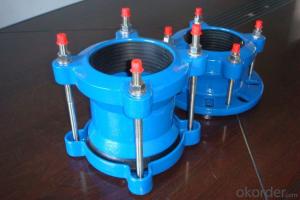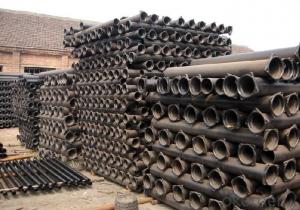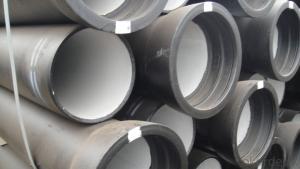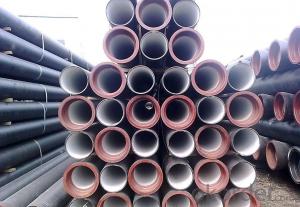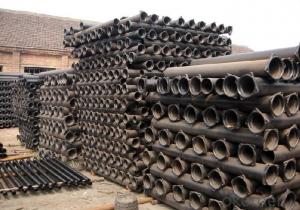Ductile Cast Iron Pipe ISO2531 / EN545 On Sale
- Loading Port:
- China main port
- Payment Terms:
- TT OR LC
- Min Order Qty:
- 199 m
- Supply Capability:
- 9999 m/month
OKorder Service Pledge
OKorder Financial Service
You Might Also Like
1,Ductile Iron Pipe Description :
1) Pipes confirm to ISO2531,K9 class,T type joint,6m long,with inside cements lining conform to ISO4179, outside Zinc spraying(130g/m2) and bitumen coating(70μm) conform to ISO8179.
2) Pipe ends: Spigot and socket ends, with 100% SBR rubber gaskets
accoding to ISO4633
3) we can do third party inspection according to customer's request.
4) Our products have been sold to many international market,
such as Middle East and South East Asia and Africa.
2,Main Features of the Ductile Iron Pipe:
·High yield strength
·High tensile Strength
·High corrosion resistance
·Pressure Resistence
·Anti-corrosion
·Installation is convenient
·Satisfy the highest hygienic standards
3,Ductile Iron Pipe Images:
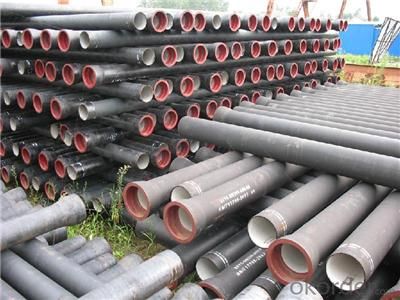
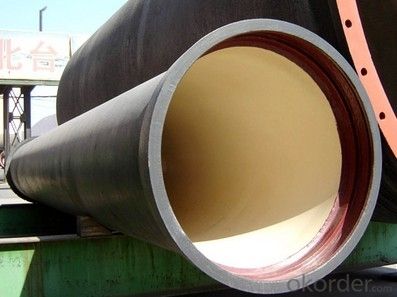
4.FAQ:
We have organized several common questions for our clients,may help you sincerely:
Q: Why would you choose ductile iron pipe rather than other pipe materials?
A:The reasons are obvious for that not only ductile iron pipe possesses the inherent strength and flexibility of ductile iron, combined with proven corrosion protection systems, but also the cost savings can be achieved from design to installation and commissioning.
Q:Why can you guarantee the inner of pipes can’t be corroded?
A: High alumina cement mortar lining and sulphate-resistant cement mortar lining. These two special linings are applicable to inner anti-corrosion for sewage pipes, improving resistance to erosion of the sewage components.
- Q: What is the maximum pressure rating for ductile iron pipe?
- The maximum pressure rating for ductile iron pipe typically ranges from 350 to 500 psi, depending on the diameter and wall thickness of the pipe. However, it is always recommended to consult the manufacturer's specifications for accurate and specific pressure ratings.
- Q: What are the common pressure ratings for ductile iron pipes?
- Common pressure ratings for ductile iron pipes vary depending on the specific application and industry standards. However, the most commonly used pressure ratings for ductile iron pipes are Class 150, Class 200, Class 250, and Class 350. Class 150 ductile iron pipes are typically used for low-pressure applications, with a working pressure of up to 150 psi (pounds per square inch). These pipes are commonly used for water distribution systems, irrigation, and gravity flow sewer systems. Class 200 ductile iron pipes have a higher working pressure of up to 200 psi. These pipes are often used for applications that require a slightly higher pressure, such as industrial water supply, fire protection systems, and wastewater treatment plants. Class 250 ductile iron pipes have a working pressure of up to 250 psi. These pipes are suitable for more demanding applications, such as high-pressure water supply systems, power plants, and municipal water distribution networks. Class 350 ductile iron pipes have the highest working pressure rating, with a maximum pressure of up to 350 psi. These pipes are typically used for heavy-duty applications, such as industrial water supply, oil and gas pipelines, and large-scale water transportation projects. It's important to note that these pressure ratings are general guidelines and may vary depending on the specific manufacturer and product specifications. Consulting industry standards and guidelines, as well as working with qualified engineers and professionals, is essential to ensure the correct pressure rating is selected for a particular ductile iron pipe application.
- Q: How do ductile iron pipes handle water velocity?
- Ductile iron pipes are capable of handling high water velocities due to their inherent strength and durability. The material's flexibility enables it to withstand the force and pressure created by fast-moving water, making it suitable for applications where high water velocity is a concern.
- Q: Can ductile iron pipe be used for underground fire protection systems?
- Yes, ductile iron pipe can be used for underground fire protection systems. Ductile iron is known for its strength, durability, and corrosion resistance, making it a suitable material for such applications. It can withstand high pressures and temperatures, ensuring reliable and long-lasting performance in underground fire protection systems.
- Q: Can ductile iron pipes be installed outdoors?
- Graphite is exist in spherical form, usually graphite size is 6-7, casting spheroidization grade control requirements for 1-3 quality (spheroidization rate greater than 80%), so the mechanical properties of the material itself has been improved, has the essence of iron, steel performance. The annealed ductile iron pipe is composed of ferrite and pearlite. The mechanical properties of the ductile iron pipe are better.
- Q: How are ductile iron pipes transported and stored?
- Ductile iron pipes are typically transported and stored in a systematic and careful manner to ensure their safety and integrity. Transportation of ductile iron pipes usually involves the use of specialized vehicles, such as flatbed trucks or trailers, that are capable of accommodating the size and weight of the pipes. These vehicles are equipped with appropriate securing mechanisms to prevent any movement or damage during transit. The pipes are loaded onto the vehicles using forklifts or cranes, ensuring that they are properly supported and balanced to avoid any bending or deformation. During transportation, it is crucial to protect the pipes from external factors that could potentially cause damage. This includes placing covers or wraps over the pipes to shield them from adverse weather conditions, such as rain, snow, or excessive sunlight. Additionally, securing the pipes with straps or chains can prevent any shifting or rolling during transit. When it comes to storage, ductile iron pipes are typically stacked on specially designed racks or supports in a horizontal position. This allows for even weight distribution and minimizes the risk of deformation or stress on the pipes. The storage area should be clean, dry, and well-ventilated to prevent corrosion or deterioration. It is important to handle ductile iron pipes with care to avoid any impact or rough handling that could result in cracks or fractures. Workers involved in the transportation and storage process should be adequately trained to ensure they follow proper protocols and use the necessary equipment, such as lifting machinery and protective gear. Regular inspection of transported and stored ductile iron pipes is essential to identify any signs of damage or corrosion. This allows for timely repairs or replacements, preventing any potential issues when the pipes are installed for their intended use. Overall, the transportation and storage of ductile iron pipes require careful planning, proper equipment, and adherence to safety protocols to ensure their condition and performance are maintained.
- Q: Can ductile iron pipe be used for industrial applications?
- Yes, ductile iron pipe can be used for industrial applications. Ductile iron pipe is known for its strength, durability, and flexibility, making it suitable for a wide range of industrial settings. It is commonly used for transporting water, wastewater, and other fluids in industrial facilities such as power plants, chemical plants, refineries, and manufacturing plants. Ductile iron pipe is resistant to corrosion, which is important in industrial environments where the pipes may be exposed to chemicals, high temperatures, or abrasive materials. Additionally, its high tensile strength allows it to withstand high-pressure applications, making it ideal for industrial use. Overall, ductile iron pipe is a reliable and cost-effective choice for various industrial applications.
- Q: What are some common applications for ductile iron pipe?
- Ductile iron pipe, known as DI pipe, is extensively utilized in a variety of applications because of its durability, strength, and ability to resist corrosion. The following are some common uses of ductile iron pipe: 1. Water Distribution: DI pipe is widely employed in the distribution of clean water. Its high tensile strength enables it to withstand high water pressure, making it perfect for water mains, water transmission lines, and water distribution networks. 2. Sewer Systems: DI pipe is commonly utilized in sewer systems because of its corrosion resistance and ability to handle heavy loads. It is often used for gravity sewer lines, force mains, and stormwater systems. 3. Industrial Applications: DI pipe is used in various industrial settings, such as power plants, chemical plants, and refineries. It is utilized for the transportation of water, wastewater, and other fluids in these industries. 4. Irrigation Systems: Due to its strength and long lifespan, DI pipe is suitable for irrigation systems, particularly in agricultural areas. It is used to transport water for irrigation purposes, ensuring efficient water distribution in fields and farms. 5. Fire Protection Systems: DI pipe is commonly employed in fire protection systems, including fire hydrants, fire sprinkler systems, and fire suppression systems. Its robustness and ability to withstand high pressure make it an excellent choice for reliable and effective fire protection. 6. Pumping Stations: DI pipe is frequently utilized in pumping stations, which are crucial for various water-related applications. It is used in water intake systems, wastewater pumping stations, and water treatment plants to efficiently transport water and wastewater. 7. Municipal Infrastructure: DI pipe is widely used in municipal infrastructure projects, such as road drainage systems, culverts, and bridge crossings. Its strength, durability, and ability to withstand external loads make it suitable for these applications. 8. Gas Distribution: Although primarily used for water-related applications, DI pipe is also utilized for the distribution of natural gas and other gases. It is preferred for gas distribution due to its resistance to corrosion and ability to withstand high-pressure environments. In conclusion, ductile iron pipe has a wide range of applications and is preferred in situations that require strength, durability, and resistance to corrosion. Its versatility and reliability make it a popular choice for various infrastructure projects and industrial applications.
- Q: Can ductile iron pipes be used in dam or reservoir projects?
- Ductile iron pipes are highly suitable for dam or reservoir projects. Their strength, durability, and resistance to corrosion are well-known, making them a preferred choice for a range of applications, such as water distribution and transmission systems. In projects involving dams or reservoirs, where the pipes must endure high pressure and transport large volumes of water, ductile iron pipes are often the top choice. Their exceptional mechanical properties, including impressive tensile strength and impact resistance, guarantee their ability to handle the load and offer a dependable and long-lasting solution. Moreover, ductile iron pipes can easily adapt to various installation methods, including trenchless techniques, making them a versatile option for dam or reservoir projects.
- Q: How do ductile iron pipes compare to PVC pipes?
- Ductile iron pipes are generally stronger and more durable compared to PVC pipes. They have a higher tensile strength and can withstand higher pressure, making them suitable for more demanding applications such as water mains and sewer lines. PVC pipes, on the other hand, are lightweight, easy to install, and resistant to corrosion, making them a popular choice for household plumbing and irrigation systems. Ultimately, the choice between ductile iron and PVC pipes depends on the specific needs and requirements of the project.
Send your message to us
Ductile Cast Iron Pipe ISO2531 / EN545 On Sale
- Loading Port:
- China main port
- Payment Terms:
- TT OR LC
- Min Order Qty:
- 199 m
- Supply Capability:
- 9999 m/month
OKorder Service Pledge
OKorder Financial Service
Similar products
Hot products
Hot Searches
Related keywords
